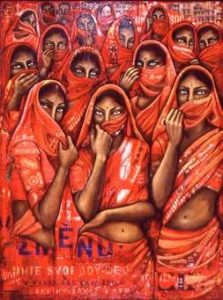
Have you heard of a woman called Jochebed? I certainly hadn’t, although I went to seminary, studied the Bible in depth and knew her story well. And even if you don’t know her name, I’m guessing that you too know her story. She was a mother like so many mothers in the Bible who are famous mainly because of the babies they birthed. Mary, and Sarah; Eve and Elizabeth all had sons who in one way or another changed history. And not only Biblical mothers. Abigail Adams was the wife and mother of two presidents, as was Barbara Bush. Alberta Williams King, Martin’s mother, taught her son that segregation was simply “a social condition rather than a natural order.” Yet unlike these, Jochebed is called only “his mother” in the familiar passage that we all know. It’s the one about the baby in the basket.
Jochebed was the mother of Moses. He was her third child, after his sister Miriam and brother Aaron. But he was born in Egypt at the wrong time, when Pharoah, fearing a revolt by the Hebrew slaves, ordered his soldiers to kill all the male babies of Hebrew mothers. Knowing that her infant son was in danger, Jochebed, along with her daughter Miriam, came up with a plan to save the baby’s life. Later, of course, that child would become the great leader who led his people from slavery to freedom. Jochebed was the mother who was willing to give up her child, was willing to take the risk that he would survive the slaughter, not knowing if her plan would work. As the reed basket that she placed him in disappeared around the bend in the river, she believed that she would never see him again or learn his fate. Eventually, though, the basket reached the place where Pharaoh’s daughter and her maids were bathing in the river. The women spotted the baby, took him into the palace where he would be raised him as a prince. Moses was rescued by the daughter of the man who wanted him dead. Brave and clever Miriam, Moses’ big sister, approached the princess and told her she knew of a wet nurse for the baby. And so it was that Jochebed was reunited with her baby son as his nurse in Pharoah’s palace.
Three strong, loving women conspired to save a baby’s life. If not for these women, would the Hebrew people have made it safely back to Canaan? Would there have been another leader “chosen by God” to rescue them?
Jochebed is one example of an unnamed woman who turned the tide of history. The only way we do know her name is a brief mention in the book of Numbers: “The name of Amram’s wife was Jochebed daughter of Levi , who was born to Levi in Egypt; and she bore to Amram: Aaron, Moses and their sister Miriam.” (Note how Miriam is mentioned last, even though she was older than Moses). In my Bible, that’s almost 150 pages after the story of Moses’ rescue. And it’s clear from those few words that she’s mentioned only as a daughter, a wife and a mother.
Why is Jochebed important? Because she stands for so many unnamed women whose courage and cleverness, selfless love, determination and unwavering faith have led them to make hard choices for the sake of a greater cause. Who have chosen life, sometimes at great cost to themselves. History, in this case, Judaeo-Christian history, would have been a different story if not for Jochebed. Or would there even be such a history? Who knows? But it’s clear that Jochebed is a shining example of this truth: one person can change the world.

2 Responses
So moving. Somehow this should be a “popular” story – what an inspiration it could be to young mothers! Thanks for another meaningful paper!
Thank you Polly. ” Hard choices for the sake of a greater cause” – pretty much sums up motherhood – the ultimate act of love. Makes me think of the multitude of mothers and fathers who gave up their children for adoption.